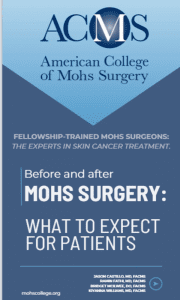Mohs Surgery Questions
We know you have Mohs Surgery questions. Here are a few of our most commonly heard questions, but if you have more, please reach out to us by one of the methods on our contact us page.
Being diagnosed with skin cancer of any type can be scary. We are here for you in this journey. Please reach out with any questions, Mohs surgery questions or any other type of question. The more you know and understand, the better you will feel. Knowing you are with a team of experts we hope will offer some peace of mind.
- Will my insurance cover the cost of surgery?
Most insurance policies cover the costs of Mohs surgery and the reconstruction of the resultant surgical area. Please contact your insurance carrier directly for the most current payment information relative to this surgery. If you have specific questions regarding insurance or billing matters, please contact our office. - What should I wear?
Comfortable clothing that can easily be removed if necessary is best. You may want to bring a sweater as the temperature in our office varies from area to area. -
Can I eat or drink on the day of surgery?
Yes. There are no eating restrictions for your surgery. We encourage you to eat a healthy breakfast on the morning of your surgery. Please no alcoholic beverages the evening prior to your surgery appointment. - How long does Mohs surgery take?
The length of the surgery varies and depends on the extent of the skin cancer. You should expect to be in the office for most of the day. Most of your time will be spent in our private Mohs waiting room while your tissue is in the lab undergoing processing. - Do I need someone to accompany me on the day of surgery?
It is recommended but not necessary that you have someone accompany you on the day of surgery. There are some special circumstances, however, for which we will insist that you have someone accompany you on the day of your surgery. We ask that you limit the number of people. - Should I take my regularly prescribed medications on the morning of the surgery?
Yes. Take your regularly prescribed medications as they have been prescribed. - Are there any medications that I should avoid prior to surgery?
If you are on blood thinning medications such as Aspirin, Coumadin, Plavix or Warfarin, please ask your prescribing physician for permission to discontinue these prior to surgery, and do let us know that you normally take these medications. - Will I be able to return to work after my surgery?
You will be able to return to work if you feel able. If you have a physical job which requires heavy lifting (more than 25 lbs.), bending or exercise, we may ask you to refrain from those activities for the week following your surgery. - Can I resume physical activities after my surgery?
We will ask you to refrain from heavy lifting, bending, or exercise, for one week after your surgery. This includes power walking, yoga, golf etc. - What kind of anesthesia will be used for my procedure?
General anesthesia is not necessary for this procedure. Local anesthesia will be used similar to what was used at the time of your biopsy. - What are the potential complications of surgery?
Bleeding and infection are the two primary complications. Both of these are uncommon. We will discuss with you how to recognize these problems should they occur. - Will I have stitches following the surgery?
Most likely you will have stitches on your surgical site. There are some instances, however, that a wound can heal in on its own. You will receive specific instructions on how to care for your wound/stitches after surgery. - Will the surgery leave a scar?
Yes, any form of treatment will leave a scar. In most cases, when we say a scar, we are talking about a narrow white line. Each person reacts differently to the surgical outcome, but we can comfortably tell you that the vast majority of our patients are exceptionally pleased on how well the surgical site heals. Obviously, the amount of scarring can increase with the size of the cancer. For our patients who use makeup, our surgical work is usually fully able to be camouflaged within several weeks after surgery. To view before and after images of Mohs surgery, click here. This content may be sensitive to some viewers. As you will see on the post-op images, scarring is minimal in most cases.
If you are interested in learning more about Mohs surgery, contact our office.
For further Mohs Surgery questions, you can also visit:

